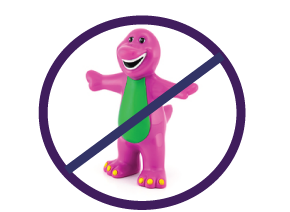Self-Esteem
The Purple Dinosaur Was Wrong!
Yes, love your children unconditionally. But help them earn their self-esteem.
Posted May 28, 2015
Yes, the purple dinosaur has done a lot of damage.
Not by himself, of course. He had a lot of help. We generally think that children have to have positive self-esteem in order to be successful in any given task. We hear this all around us. Many parents praise their children for the smallest of accomplishments. The purple dinosaur tells kids that they don’t have to do anything to be special. We give trophies to everyone to make sure that no one feels badly.

There was a wonderful cartoon by Edward Koren in the New Yorker many years back. It shows a father and a son on the ski slope. The son has just fallen flat on his face. Not wanting to make the child feel badly about his fall, the father says, “Great fall, Josh!”
But my favorite example of how we heap praise on children is the otherwise wonderful PBS show Arthur the Aardvark. You’ve heard the song: “Believe in yourself – cuz that’s the place to start!”
Yes, we want children to believe in themselves. But that is NOT, actually, the place to start. It’s as if I said to you: There’s a plane – can you fly me to New York? You say, “No, I don’t know how to fly” – to which I respond: “Believe in yourself! That’s the place to start”. That's a formula for disaster.
We don’t first feel self-esteem and then become successful at tasks. In fact, it’s largely the other way around. It is only after we are able to experience a degree of success that we are able to experience self-esteem.
But you might ask, “What if a child can’t be successful? What if she tries to do her homework and fails? What then? She’ll certainly feel bad about herself then!
But this implies that children learn to do things on their own, without help. Expecting children to learn to do things well on their own is a formula for failure. If a child is having difficulty with something, it’s the job of the parent or teacher to help the child improve. They need adults to hold them to high expectations and then help them struggle through difficulty until they succeed. Self-esteem comes from a hard won job well done; not from being told that I’m special.
Failure is not the enemy of self-esteem. But protecting children from failure is almost certain to bring about low self-esteem. Failure is inevitable. Failure is generally the first step to success. We must fail many times before we achieve. Rather than protecting children from failure, we must teach them how to cope with failure, learn from it, and persevere through to success.


